William Blake illustrated Paradise Lost more often than any other work by John Milton, and illustrated Milton's work more often than that of any other writer. The illustrations demonstrate his critical engagement with the text, specifically his efforts to redeem the "errors" he perceived in his predecessor's work.
Description and provenance
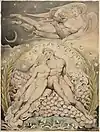
The Thomas set
The paintings of the Thomas set are each approximately 10 x 8.25 inches. They were commissioned by the Reverend Joseph Thomas at an unrecorded date, sometime before 1807. Although the sheets were trimmed at some time, obliterating the date from several, some still retain the date of 1807, establishing the year of their completion. Thomas' grandson inherited them from his father, and sold them at Sotheby's in 1872. By 1876 they were in the collection of Alfred Aspland, who by 1885 took them to Sotheby's again, dispersing the set among several buyers. Henry Huntington reunited the works in 1914, and today they are still in the collection of the Huntington Library.
The Butts set
The dimensions of the Butts set, also known as the "large set", are 19.5x15.5 inches, nearly twice that of the Thomas set. Dated 1808, they were commissioned from Blake by his patron Thomas Butts, who also commissioned many paintings on biblical themes from Blake. In the early 1850s, Butts' son Thomas Butts Jr. offered the individual paintings for sale at several auctions, resulting in the dispersal of the set. Today it remains divided between four museums. Nine of the paintings were sold at Messrs. Foster in 1853 to J. C. Strange, passing through several other hands before they were acquired by the Museum of Fine Arts, Boston, their present owner. The other three were sold to one "Fuller" at an unknown date, from whom they passed to H.A.J. Munro. Munro further complicated matters by selling the three paintings to separate buyers at Christie's in 1868. No. 1 was acquired by the Victoria and Albert Museum in 1869, No. 2 by Henry Huntington in 1916, and No. 10 by the Houghton Library in 1966.
The Linnell set
The Linnell set is incomplete – it contains only Satan Watching the Endearments of Adam and Eve, The Creation of Eve and Michael Foretells the Crucifixion. These are exactly the same as their corresponding entries in the Butts set in both size and composition, the major difference being their loose handling of the watercolor. Like the Linnell set of William Blake's Illustrations of the Book of Job, these were commissioned by Blake's patron John Linnell, and traced by Linnell from the Butts set. An entry in Linnell's journal dates the commission to 9 May 1822. Currently Satan Watching the Endearments of Adam and Eve and The Creation of Eve are in the collection of the National Gallery of Victoria, and Michael Foretells the Crucifixion is in the collection of the Fitzwilliam Museum.
Analysis
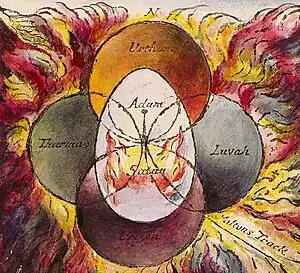
There are twelve plates in each of the Paradise Lost sets, one for each of the books in the poem. While some of these, such as Satan, Sin and Death: Satan Comes to the Gates of Hell, depict specific scenes from the epic; others, such as Satan Watching the Endearments of Adam and Eve, are syntheses of several scenes.[1] In the latter case, Blake employed visual barriers to separate the elements from different scenes, such as the arc of the bower in Satan Watching the Endearments of Adam and Eve.[2]
In Blake's mythology, Albion's fall from a divine androgyny to a sexual nature divides him into the Four Zoas, their spectres (representative of hypocritical morality), and their emanations (female halves). In the Paradise Lost illustrations, Adam is analogous to the fallen Albion, Satan to Adam's Spectre, and Eve to Adam's emanation.[3]
Table of Illustrations
| Thomas set | Butts set | Linnell set | Title | Related works by Blake | Notes |
|---|---|---|---|---|---|
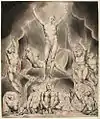 |
 |
Satan Arousing the Rebel Angels | 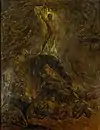 |
||
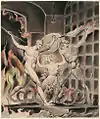 |
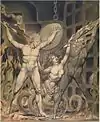 |
Satan, Sin, and Death: Satan Comes to the Gates of Hell |
|||
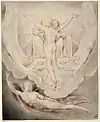 |
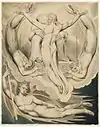 |
Christ offers to Redeem Man | |||
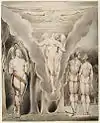 |
Satan Spying on Adam and Eve and Raphael's Descent into Paradise | ||||
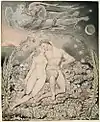 |
 |
 |
Satan Watching the Endearments of Adam and Eve | 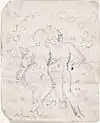 |
|
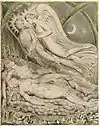 |
Adam and Eve Asleep | ||||
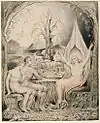 |
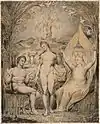 |
Raphael Warns Adam and Eve | |||
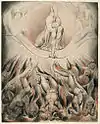 |
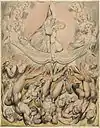 |
The Rout of the Rebel Angels | |||
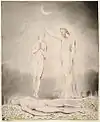 |
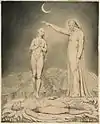 |
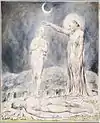 |
The Creation of Eve | ||
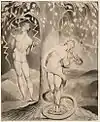 |
_-_Google_Art_Project.jpg.webp) |
The Temptation and Fall of Eve | 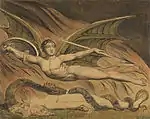 |
||
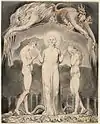 |
 |
The Judgment of Adam and Eve: "So Judged He Man" | |||
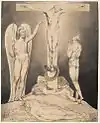 |
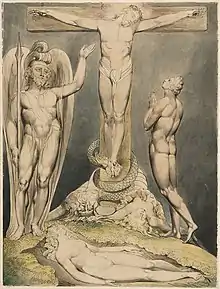 |
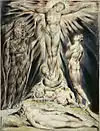 |
Michael Foretells the Crucifixion | ||
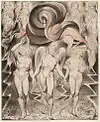 |
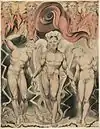 |
The Expulsion of Adam and Eve from the Garden of Eden |
Citations
References
- Behrendt, Stephen C. (1983). The Moment of Explosion: Blake and the illustration of Milton. Lincoln: University of Nebraska Press. ISBN 0-8032-1169-4.
- Butlin, Martin. The Paintings and Drawings of William Blake. 2 vols. New Haven, CT: Yale University Press, 1981.
- Dunbar, Pamela (1980). William Blake's Illustrations to the Poetry of Milton. Oxford: Clarendon Press. ISBN 0-19-817345-8.
- Werner, Bette Charlene (1986). Blake's Vision of the Poetry of Milton: illustrations to six poems. Lewisburg: Bucknell University Press. ISBN 0-8387-5084-2.